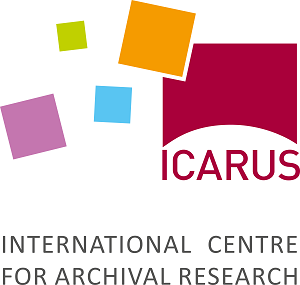Call and submission > Call for paperTo propose a paper (deadline 15 Feb. 2022): https://icarus-28.sciencesconf.org/submission/submit The International Centre for Archival Research (IcarUS) will hold its next Spring conference on May 23rd-25th, on the theme: “Archives privées et archives publiques au xxie siècle / Private and public archives in the 21st c.”. The conference will take place in the conference center of Campus Condorcet in Paris-Aubervilliers and is organised by Institut de Recherche et d’Histoire des Textes (CNRS) with the support of the French Ministry of Culture and the National Archives (Archives nationales). Archival science makes one of its most fundamental dichotomies by separating public and private archives or records. There are, nonetheless, numerous overlaps. Private papers cover an immense scope of documents, from correspondence to parish bulletins, from narrative texts to accounts and to family photographs and home movies. Aquisitions and donations of private documents allow public archives everywhere to complete their collections, and thus to record the history of various actors. In France and elsewhere, large-scale collecting operations are undertaken either to have private records enter public heritage, as was the case with the so-called « great collection » of documents regarding the first World War, or for archival documents to be created ad hoc, like the « Lockdown Memories » operation. Crowdsourcing illustrates yet another aspect of the moving frontiers between private and public records : for instance in the case of public birth or death registers associated to parish registers that can be considered to be public or private material depending on their dates or countries they originate in, but also in the case of iconographic documentation and press material of private origin. Participative processes encourage individuals to directly create public data, not only the metadata they may enrich existing document with, but also complete documents (e.g. the testaments of French soldiers in public archives). The relationship between these two types of archivalia is also strongly shaped by each country’s own history, and especially by the phases of confiscation or transfer of archival collections (secularization etc.) they may have experienced ; the French case is a good illustration of this, due to the massive consequences of the seizures made under the Revolution and of the in-depth restructuration of the archival landscape that ensued. ICARUS’ origins and activities are at the roots of its implication in the complementary treatment and promotion of public and private records. For the benefit of researchers and historians, the Monasterium.net, Matricula-online, and Topothek portals give united access to documents held in private institutions as well as in public archives, according to the nature of the documents more than to their repositories or to status of the corresponding institution. The « topotheques » capitalize on technical progress to conduct digital operations of collection and promotion without having to impose property transfers, especially for the archives held by individuals or associations. The main orientations for the conference will be :
To propose a paper (deadline 15 Feb. 2022):
The scientific committee consists of Dr. Sébastien Barret (IRHT, Paris, France), Frédérique Bazzoni (Ministry of Culture, Paris, France), Dr. Vlatka Lemić (University of Zagreb, Croatia), Jean-François Moufflet (Archives nationales, Paris, France), Dr. Dominique Stutzmann (IRHT, Paris, France), Dr. Edouard Vasseur (Ecole nationale des Chartes, Paris, France), Dr. Žarko Vujošević (Belgrade University, Faculty of Philosophy, Belgrade, Serbia) |


